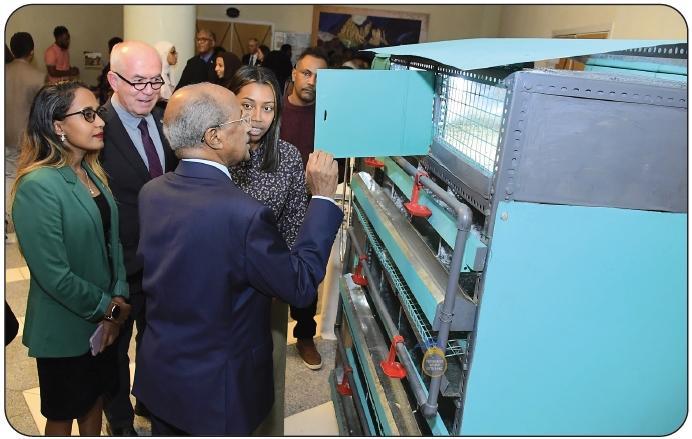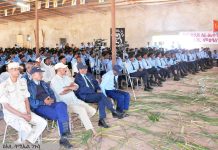Africa-Press – Eritrea. At just 23, Melika Even Zekarias is not only a high school teacher in Keren and a distinguished graduate of the College of Agriculture, but also a burgeoning agricultural innovator. Along with her father, Even Zekarias, she has developed and successfully marketed a vertical poultry cage named “Akberet”—a project now attracting widespread praise for its practical and hygienic solution to urban chicken farming.
Melika, who majored in Plant Health and graduated with distinction, recently sat down to discuss the four-year journey of research and collaboration that brought “Akberet” to life.
What is the “Akberet” project that has attracted so many users and received such praise?
“Akberet” is the name we gave to our family-developed poultry cage. My father and I realized that while chicken farming is a long-standing tradition in Eritrea, it poses significant hygiene and space challenges in modern urban residences. Our goal was to facilitate poultry farming in a modernized and urbanized way.
The project was a true collaboration: I handled the extensive four years of research and study required, drawing on vertical farming concepts, while my father oversaw the innovation and construction. After numerous trials and errors, we were able to finalize and successfully market it.
Why the name “Akberet”?
We named it “Akberet,” which is a Tigrigna word that translates to “respective” or “dignified,” to be a continuation of the legacy of the “Adhanet” stove that transformed our society’s cooking lifestyle. We believe the “Akberet” cage can transform the way our society practices chicken farming by eliminating unpleasant odor and mess. It promises a maximized outcome with minimized input.
You mentioned the cage eliminates the disadvantages of traditional farming. What are the key benefits of this urbanized system?
The primary advantage is that it eliminates the hardships of raising chickens in a small residence. We eliminated the mess: the cage is constructed with a system of water, food, and waste pipes that ensure cleanliness and hygiene for each chick.
Crucially, “Akberet” offers significant economic savings:
50% Feed Reduction: Chickens raised in the cage consume 50% less food than those raised traditionally in a hall. This is because the confined space reduces the chickens’ constant movement, lowering their metabolism and need for high caloric intake.
Improved Health: The systematic ventilation prevents the presence of common parasites, leeches, and other viral diseases that easily affect chickens, which have very weak immune systems.
Even Nutrition and Higher Yield: All chickens are given food and water evenly, ensuring smaller chicks are not underprivileged. This, in turn, helps multiply egg production and boost the supply of essential nutrition to the society.
How has the public response been since the launch a year ago?
We’ve been very blessed. We sold the first cage about a year ago, and since then, we have sold them in regions including Ghindae, Keren, Tesseney, and mostly in Asmara. We are honored to receive comments from users saying the cage has helped them run a successful chicken farm and has transformed their lives financially. The encouragement from the community drives us to keep developing the design.
You recently participated in the UN Day youth innovation event. How was that experience?
It was incredible. It was a big achievement just to be part of such a major event. I was genuinely surprised to meet so many intelligent youths with breathtaking innovative works. Getting praise for our project from great people from all around the world was a huge boost. I am so grateful to the Ministry of Agriculture for giving my father and me the chance to present our project.
What are the next steps for the “Akberet” cage?
We are actively planning and researching to maximize the outcomes for our users. This includes two major efforts: Genetic Modification Research that Incorporates genetically modified organisms (GMOs) with our chickens to further maximize their productivity; Protein-Rich Feed: Researching and raising certain insects— commonly used in other African countries and high in protein—to incorporate into the chickens’ diet. We are currently conducting thorough research at home with the goal of achieving two eggs per chicken per day.
Finally, what is your personal vision for the agricultural field?
There is no life without agriculture, as everything starts there. I want to be a part of this journey, to work on incredible projects, and keep developing expertise in this vital field.
Thank you, Melika. We wish you and your father all the best with the “Akberet” project.
For More News And Analysis About Eritrea Follow Africa-Press







